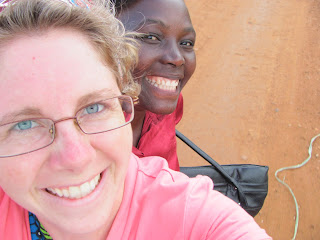I was so enjoying my time at church. The rain that had threatened to dampen the morning had come and gone, the sun was shining, the walk was enjoyable, and it was good to be with family in Christ as we worshiped our God and heard from His Word while sitting in the fresh air under the trees. It had been a long time since I had been to this church, and it felt good to be back.
Early on in the service a young woman clutching a baby sat down next to me. The woman looked young - probably younger than 20. I introduced myself and asked her name and the baby's too. I am not sure how it happened but she began sharing about the death of the baby's father and how she was left to care for it, though without resources. She wondered what I would do to help her. Later she said the baby cried very little and was good natured. It was as if she was "selling" her baby to me. I am still not sure if this young woman was the mother or not of this dear little girl.
Such questions and pleas are so common for the "mzungus" ("white people") who serve and visit here. I have had other similar conversations in which I am basically asked "What will you do for me?" Ugandans often assume that because we are white we must be "rich" and have access to vast resources. Am I target for requests because of the pigment of my skin?
As I pondered such things on my walk back from church, I wondered if God sometimes feels the same way. That His children only come to Him when they need or want something. We ask for His blessing, His protection, His healing, His provision, His guidance, His ______ - fill in the blank. But do we seek to simply be in His presence, so that we may spend time with Him, so that we may know Him more, not to know His blessings more? Do I go to God only when I am lacking? Do I see Him as my "Sugar Daddy?"
As I thought about this young mother's situation and her misguided request, I was convicted as I reviewed my prayer life. How many times recently had I gone to God with petitions, not praises? With wants and not worship?
"Let all that I am praise the Lord; with my whole heart, I will praise His holy name. Let all that I am praise the Lord; may I never forget the good things He does for me. He forgives all my sins and heals all my diseases. He redeems me from death and crowns me with love and tender mercies.
"Praise the Lord, you angels, you mighty ones who carry out His plans, listening for each of His commands.
"Yes, praise the Lord, you armies of angels who serve Him and do His will!
"Praise the Lord, everything He has created, everything in all His kingdom.
"Let all that I am praise the Lord." - Psalm 103:1-4, 20-22
Our God deserves all praise, glory, honor and worship! May this be the first priority as we enter His presence.
Image Source: Microsoft Office Clipart
Photo Source: http://www.flickr.com/photos/supersonicphotos/4009163139/#









